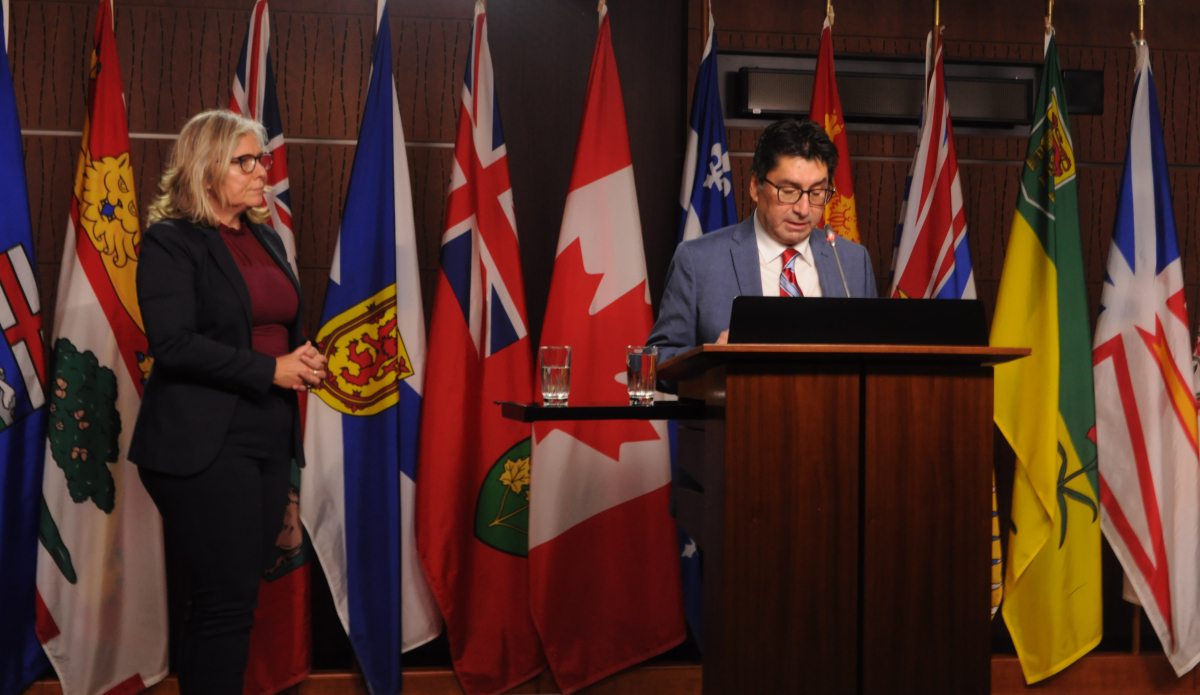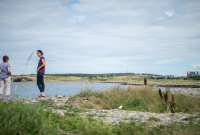Support strong Canadian climate journalism for 2025
Kiashke Zaaging Anishinaabek (KZA), otherwise known as Gull Bay First Nation, has launched a legal challenge against Canada over inequitable funding of its police service. And Chief Wilfred King notes his nation has won every court case it’s ever fought.
King travelled to Parliament with lawyer Chantelle Bryson Monday to announce the legal challenge. The lawsuit states Canada is not meeting its fiduciary and other legal obligations under the United Nations Declaration on the Rights of Indigenous Peoples (UNDRIP) and Section 35 of the Charter of Rights and Freedoms, which pertains to Indigenous rights and title.
KZA, which sits 250 kilometres northeast of Thunder Bay, Ont., has only three police officers on staff, one of whom is on leave.
KZA officers lack a dedicated station and professional equipment like radios, and often work with no backup when responding to calls in the community, Bryson said.
There are times when there is no KZA police officer on the job within the community, King said. It’s a problem given the community’s distrust of the Ontario Provincial Police (OPP).
In the summer of 2019, an OPP sergeant reportedly took a young man from the community on a so-called “moonlight tour,” leaving him on the side of the road without food or water in a remote area.
The officer was later transferred from her post after KZA and the Chiefs of Ontario contacted the OPP commissioner directly, according to the OPP.
There have also been times where the OPP have declined to help when called to backup in the community, King said, noting a volatile situation where he said an impaired driver was threatening him and others.
King said the urgency of the legal challenge was driven home by the recent tragedy in James Smith Cree Nation where a man killed 11 and wounded 18 others. RCMP officers took 40 minutes to arrive at the community once called.
Situations like the one in James Smith Cree Nation have led First Nations, including KZA, to sometimes ban violent offenders from their community as a last resort. Yet, King said the OPP told him it wouldn’t enforce the band resolution to ban violent offenders.
“The time is now that First Nations must take complete control of police services in their own communities,” King said.
There have been recent developments recognizing Indigenous police services as an essential service, however that move “does not indicate any commitment of the substantively equitable fund necessary to deliver that essential service,” a KZA press release said.
The lack of core resources and backup puts a significant burden on KZA police officers, leading to burnout and mental health issues. KZA officers’ benefit allotment is capped at $1,200, while other provincial officers have unlimited benefits for mental health care, Bryson said.
Police officers elsewhere in the province keep their benefits when they leave the force, but Bryson says First Nation officers get nothing following their service.
“They're just damaged irreparably,” Bryson said.
Bryson believes instances of post-traumatic stress disorder (PTSD) are higher for First Nation police officers, given many work without the support of backup. She estimates 20 to 25 per cent of Ontario First Nations Policing Agreement (OFNPA) officers are on leave currently, including the officer on leave from KZA.
For King, the issue isn’t just the underfunding but transparency as well. King sits on the OFNPA board, and he says the OFNPA police budget is administered by the OPP, even though the First Nations employ the officers.
First Nations used to receive a breakdown of the budget, but now they don’t even have access to their own police service’s books, King said.
“When the ultimate authority lies in a colonial agency, it perpetuates the colonial mentality,” King added.
— With files from Morgan Sharp
Matteo Cimellaro / Local Journalism Initiative / Canada’s National Observer







Comments